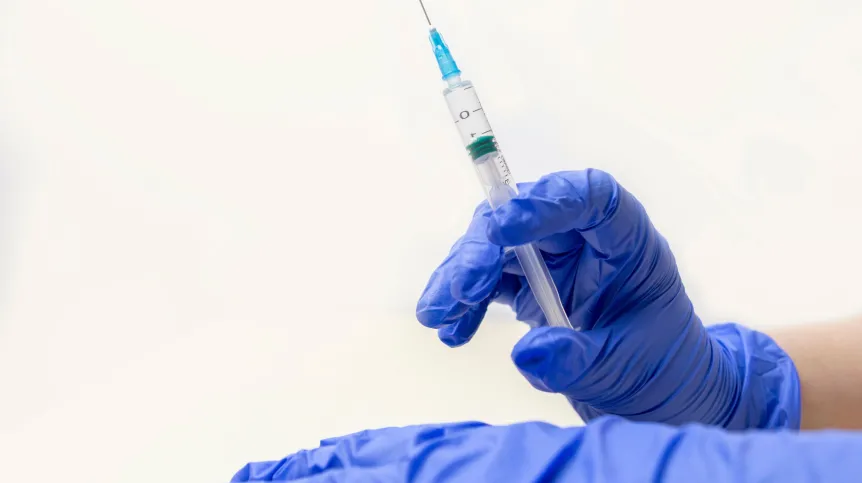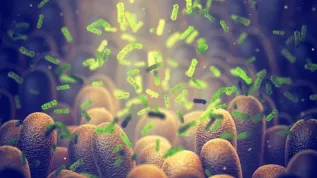
Therapeutic cancer vaccines have not yet met expectations in terms of their effectiveness, but research on them is still ongoing, experts say. Currently, research on cancer vaccines is conducted also in Poland.
Experts discussed this during the 7th expert debate of the Foundation for Polish Science organised on November 29 as part of the series 'Let's trust science'.
Professor Maciej Żylicz, a biochemist, molecular biologist and President of the Foundation for Polish Science, reminded that work on cancer vaccines has been done for decades. As he explained, this concerned not prophylactic vaccines against HPV or HBV viruses contributing to the development of cancer, but therapeutic vaccines designed to make our own immune system recognize cancer as something foreign and attack it.
Professor Maciej Żylicz noted that initially researchers were searching for changes (mutations) in the genes of cancer cells that would distinguish them from healthy cells. 'They looked for changes in genes that would be typical in all cancers. It turned out, however, that cancers were very different from each other (...) so finding a vaccine that would work on all types of cancer was practically impossible', the expert explained.
We now know that a therapeutic cancer vaccine should be more personalized to match not only the type of cancer, but also the cancer patient.
One of the promising options for cancer vaccines are vaccines based on mRNA technology, also used to develop a vaccine against the SARS-CoV-2 virus, Żylicz reminded.
'This technology was originally intended to fight cancer, but from the point of view of mRNA vaccines, cancer is a much more difficult opponent than viruses', said Professor Jacek Jemielity from the Centre of New Technologies of the University of Warsaw.
The experts explained in order to create an mRNA vaccine, the DNA of cancer cells and healthy cells of a given patient are sequenced to find those elements that most distinguish these cells from each other. 'We select about 20 different genes, and then this genetic information is transcribed into mRNA and injected into the patient', explained Professor Maciej Żylicz.
In cells, protein fragments (peptides) are created on the basis of mRNA, and immune cells learn to recognize them as foreign antigens, so that they can later recognize and attack cancer cells.
According to Professor Jacek Jemielity, mRNA can be very effective because a dozen or several dozen antigens can be encoded in one of its strands. 'These fragments do not have to be long, and additionally they can occur in several variants in case of additional mutations', he explained.
Professor Jacek Jassem emphasized that mRNA vaccines were well tolerated, easily degraded, did not integrate with the host's genome and were not infectious. 'In addition, they stimulate both humoral and cellular immunity, they are quite easy to produce, and their production is inexpensive', he said.
Professor Maciej Żylicz reminded that research was also underway on peptide anti-cancer vaccines - instead of introducing mRNA with the recipe for peptides into cells, only peptides characteristic of cancer cells are introduced. The idea is that they are then recognized by the immune cells as foreign, and as a result cancer cells will be attacked and destroyed.
Professor Krzysztof Giannopoulos, a hematologist and head of the Department of Experimental Hematooncology at the Medical University of Lublin, who worked in Germany on peptide vaccines for one of the types of leukaemia, emphasized that the most immunogenic part of the protein (the most immunogenic peptide) is administered to stimulate the response of cytotoxic lymphocytes that destroy tumour cells.
'In cancers, where - it seems - this antigen processing mechanism is impaired, a certain advantage of peptide vaccines (over mRNA vaccines - PAP) was possible', said Giannopoulos.
He reminded that in the case of cancer vaccines, one problem is that antigens on cancer cells are usually known to the body because cancers originate from our own cells. Therefore, the immune system may not recognize them as foreign.
'Mutations that lead to the formation of new antigens are relatively rare', the haematologist said. Therefore, vaccines most often use the fact that the expression of a given antigen is low on normal cells and much higher on cancer cells. 'But it is still the same antigen', he said.
In his opinion, vaccines will be used in the treatment of cancer at some stage of therapy, but it will not be such a huge breakthrough as in the case of antiviral vaccines, for example.
Professor Jacek Jemielity reminded that that work on cellular anti-cancer vaccines was also underway. They involve collecting cytotoxic T cells, which are then genetically modified to recognize the cancer and re-injected into the patient.
Professor Natalia Marek-Trzonkowska, director of the International Centre for Cancer Vaccine Science at the University of Gdańsk, is working on a new lung cancer therapy that uses knowledge about the role of regulatory T cells. These are immune cells that induce immune tolerance, which is why they have a negative role in cancer. 'Very often, cancers even lure these cells into their territory and, for example, in lung cancer we see a lot of regulatory T cells, which undoubtedly contribute to the tolerance of this cancer and weaken the effect of cytotoxic therapies. This knowledge can be used to develop an effective therapy that will destroy this immune tolerance', the expert said.
She added that her team had developed an algorithm that allowed to identify cells that recognized cancer. 'We are able to select them from the patient's blood, sort them using special devices and multiply them in vitro, so that we can then give these cells back to patients. (...) We select different cells for each patient - whole clones of killer and helper T cells, because these two types of cells work together and their presence is necessary for the therapy to succeed', she explained.
In her opinion, personalized therapeutic cancer vaccines should now be developed. 'Cancers change a lot. They are different at different stages of cancer and we need to react quickly', she said.
According to Professor Jacek Jemielity, a huge challenge in the case of cancer is its heterogeneity. 'Cancer is certainly a very difficult enemy because it has developed mechanisms to put our immune system to sleep. Therefore, there are high hopes for combining cancer vaccines with checkpoint inhibitors (drugs that make cancers more 'visible' to the immune system - PAP)', the expert said.
Professor Jacek Jassem emphasized that due to the difficulties in developing cancer vaccines, success in this field is quite moderate. 'In addition to the BCG vaccine (tuberculosis vaccine used in the immunotherapy of bladder cancer - PAP), there are two more therapeutic vaccines approved for cancer - one in the treatment of prostate cancer and the other in melanoma', said Jassem.
He added that for some time there were high hopes for the metastatic prostate cancer vaccine (Sipuleucel-T). However, it is inconvenient to manufacture and use. In addition, there is a new hormone therapy for prostate cancer that is more effective and easier to use (oral administration). The same happened in the case of melanoma, in the treatment of which effective immunocompetent drugs have been developed.
'Nevertheless, there is still interest in cancer vaccines and more than 1,000 clinical trials are currently underway', concluded Professor Jacek Jassem. According to the expert, vaccines have a number of advantages and there is a good chance of using them, maybe not in monotherapy, but in combination with other methods of cancer treatment.
PAP - Science in Poland, Joanna Morga
jjj/ agt/ kap/
tr. RL













